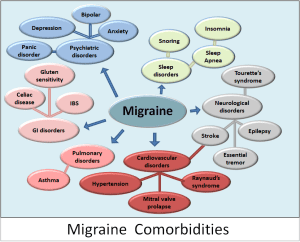Doctors say that Postdrome headache syndrome typically resolves within a few hours but the symptoms may last for two days or more.

During the Postdrome headache syndrome, a patient may not have a headache but will feel tired. (Representative Image/Creative Commons)
Doctors treating migraine headaches are now focusing on how to handle the Postdrome symptoms dubbed as “migraine hangover”.
Recent research published in Neurology says the combination of post-headache symptoms is common, following up to 80% of migraine attacks.
Even though this is quite common many do not know how to identify this and doctors are now coming up with ways to describe these symptoms.
“We see nearly 60 to 80 percent of patients coming to us with Postdrome symptoms. The rest of them, even though they may be facing these symptoms don’t visit us or report to us as their migraine headache relief would be much more important and these symptoms may go unnoticed. But it is important to address the postdrome stage too,” explains Dr Sreekanta Swamy, senior consultant, Neurology, Global Centre of Excellence in Neurosciences, Aster Hospitals.

Migraine Comorbidities listed/wikipedia commons
He explains that there are four stages of migraine. The first stage is known as Prodrome, which can last for a day or two. In this stage, one feels irritable, sensitive to light and sound, some kind of craving, frequent yawns, feel tired etc.
“The second stage is called Aura. Here the patients could experience temporary vision loss or tingling sensation. The third stage starts after the headache reaches its peak. Patients here suffer from severe head pain followed by nausea or vomiting,” added the doctor.
The patients suffer from Postdrome headache syndrome after the third stage.
During the Postdrome headache syndrome, a patient may not have a headache but will feel tired, have difficulty concentrating, experience stiffness in the shoulders, neck region, pain in the scalp region, will want to be alone not want to speak to anyone and even have symptoms of depression and guilt.
Doctors say that these symptoms typically resolve within a few hours but the symptoms may last for two days for some. “For some, this stage can be as bad as the third phase of migraine. Special care needs to be taken as there may be chances of another migraine attack if they do not address to the symptoms,” says Dr G V Subbaiah Choudhary, Neurologist, Star Hospitals, Hyderabad.
Doctors are now focussing on this fourth phase by guiding patients on how they can handle the migraine hangover.
Doctors now are asking their patients to maintain a ‘headache diary. “It is important for a migraine patient to note down symptoms and changes that occurred in the body during all the four stages of migraine,” says Dr Satishchandra P, Neurologist, Apollo Hospital.
He further adds that a patient has to note down every detail including behavioural change, physical change during the third stage and the craving they had during the prodromal stage.”
“Maintaining headache hygiene is very important. If it is consistently practised the length of migraine hangover can be reduced,” added Dr Satishchandra.
While prevention is the key to avoiding a prolonged hangover, staying hydrated, eating nutritious food, not jumping immediately into doing physical activities or getting back to work the same day as the reduction of headaches will work, say doctors.
If need be, patients are also put on mild pain killers, depending on how worse their condition is.

Jul 25, 2024

May 06, 2024

Mar 20, 2024

Mar 20, 2024

May 10, 2023

Apr 06, 2023